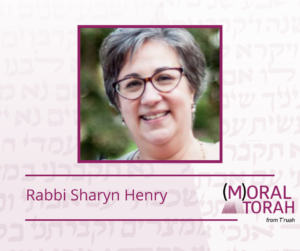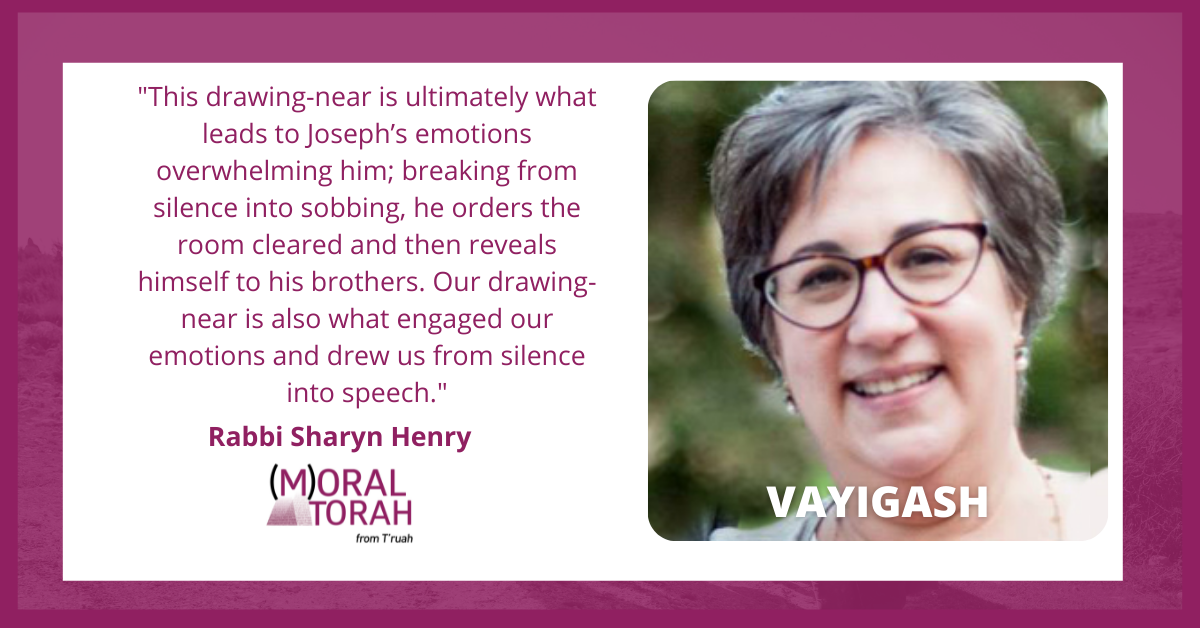A D’var Torah for Parshat Vayigash by Rabbi Sharyn Henry
Proximity, like timing, is everything. Perspective, emotion, understanding, clarity…they all change with proximity. This week’s Torah portion opens with Judah taking a step toward Joseph and with that step, everything changes.
Although Judah and his brothers and Joseph are already in the same room, Judah takes a step closer to Joseph. The word for this drawing near is “Vayigash,” which may be best translated as “came in contact” or “drew near.” Judah’s step creates intimacy, and ultimately, honesty, among the brothers. The story becomes more and more intense until finally, Joseph “can no longer control himself” and reveals himself to his brothers. (Genesis 45:1)
The proximity principle of social psychology states that the closer one is to someone (or something), the more likely there will be an attraction, or at least positive feelings. Knowing someone’s story is key to understanding and compassion. Whether or not T’ruah was consciously employing the proximity principle as they organized the first cohort of Tomato Rabbis 10 years ago, we were all changed as a result of coming into contact with the farmworkers of the Coalition of Immokalee Workers (CIW) in Immokalee, Florida.
Sign up to receive (M)oral Torah in your inbox each week.
Before my trip to Immokalee, I had never spoken with an immigrant farmworker, and so I had no idea that slavery, entrapment, exploitation, sexual harassment, and beatings were part of their experience. I had not seen the poverty; I had not understood the terror of daily life for farmworkers on American soil in this century. But as soon as I took the steps to meet them, I knew.
The Or Hachayim (Chayim ibn Attar, 18th century Morocco and Israel) offers another insight into what it means to draw near:
…the term “and Judah approached” is necessary here [since we know that Judah was already standing close to Joseph, because] the drawing near to Joseph took place within Judah’s heart, as in the verse “As face appears to face in water, so does one man’s heart to another.” (Proverbs 27:19) With these words Judah sought to inspire Joseph’s compassion, and therefore he approached him in his heart, drawing near to Joseph and truly loving him, in order to arouse Joseph’s love and spark his compassion. (quoted in Speaking Torah: Spiritual Teachings from Around the Maggid’s Table, by Arthur Green, Ebn Leader, Ariel Evan Mayse, and Or N. Rose, Vol 1., p. 153)
This drawing-near is ultimately what leads to Joseph’s emotions overwhelming him; breaking from silence into sobbing, he orders the room cleared and then reveals himself to his brothers.
Our drawing-near is also what engaged our emotions and drew us from silence into speech. This is part of what I wrote to share with my congregation in 2011, when I returned from Immokalee:
Another thing I learned in Florida is that when we see something with our own eyes we become witnesses. And, as witnesses to the truths of the tomato industry, we have two options. One is to keep silent. The other is to speak. Interesting that “witness” in Hebrew is “Ed.” Ed has two letters — ayin and daled. Ayin is silent. Daled is the first letter in “daber — speak.” To be a witness means to speak out.
Find more commentaries on Vayigash.
As witnesses, we are moved, and so we moved, from ayin to daled, from a silence that catches in our throats to speech. Daled (ד) is also delet, a door — just look at the letter’s shape! — a door we stepped through to find ourselves on a path forward.
On this week of Human Rights Shabbat, we celebrate 10 years of the Fair Food Program and all those who have walked that path together with CIW. In the decade since the first Tomato Rabbis drew near to the farmworkers in Immokalee, the programs CIW had dreamed up to protect workers’ wages, benefits, health, and safety have come into effect. New corporations have joined the Fair Food Program, it has expanded to new crops in other states, and even recently to greenhouse-grown cut flowers.  Much of this progress is due to the CIW’s practice of bringing the people and the issues to the attention of the public. When we are drawn nearer, when we know, we are obligated to speak out.
Much of this progress is due to the CIW’s practice of bringing the people and the issues to the attention of the public. When we are drawn nearer, when we know, we are obligated to speak out.
Perhaps Judah thought he was merely taking a step, but he brought his family together. Maybe my tomato rabbi colleagues thought we were going to learn about farming in the American South, but we joined a revolution for workers and their families. We might think all we are doing is taking a step in the direction of another person, or a group of people, but one single step can change worlds.
Rabbi Sharyn Henry has been a rabbi at Rodef Shalom Congregation in Pittsburgh, PA, since 1999.

